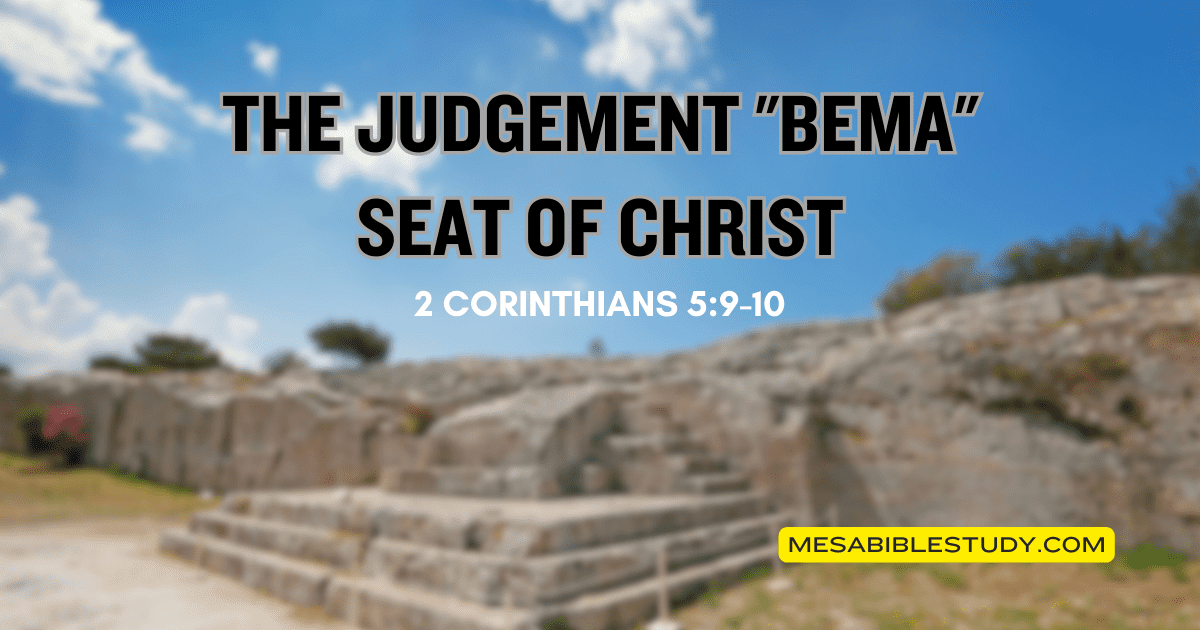‘Therefore we make it our aim, whether present or absent, to be well pleasing to Him. For we must all appear before the judgment seat of Christ, that each one may receive the things done in the body, according to what he has done, whether good or bad. ‘
II Corinthians 5:9-10
Verse 9: “Therefore we make it our aim, whether present or absent, to be well pleasing to Him.”
In this verse, Paul expresses the purpose and goal that drives him and should drive all believers. Regardless of our physical presence with Christ or being separated from Him while on earth, our ultimate aim is to be pleasing to the Lord. This speaks to the desire for believers to honor God with their actions and conduct.
Verse 10: “For we must all appear before the judgment seat of Christ, that each one may receive the things done in the body, according to what he has done, whether good or bad.”
Here, Paul highlights the reality that all believers will face a future judgment, known as the judgment seat of Christ. This judgment is distinct from the judgment of condemnation for sin, as believers have already been justified through faith in Christ. Instead, this judgment focuses on evaluating believers’ actions and deeds during their earthly lives.
These passages remind us that our choices and actions on earth have eternal consequences. While salvation is a free gift received by faith alone, the judgment seat of Christ underscores the importance of living for Christ and striving to be well-pleasing to Him. Let us seize every opportunity to fulfill our calling as ambassadors for Christ, sharing the message of reconciliation and building up the body of Christ, knowing that our faithfulness will be rewarded at the appointed time of the judgment seat of Christ.
We are Saved Unto (to do) Good Works
‘For by grace you have been saved through faith, and that not of yourselves; it is the gift of God, not of works, lest anyone should boast. For we are His workmanship, created in Christ Jesus for good works, which God prepared beforehand that we should walk in them.’
Ephesians 2:8-10
It is important to note that this judgment is not for the purpose of determining salvation. Rather, it is a reckoning of our works as believers. Did we fulfill our calling as ambassadors for Christ, sharing the gospel and living out the implications of our reconciliation with God (2 Corinthians 5:20)? This passage underscores the significance of our role and actions as representatives of Christ. The emphasis is on the heart-led quality of their service and their faithfulness in proclaiming the message of reconciliation to others.
While all believers will stand before the Bema seat judgment, the rewards received will vary. Some may receive significant rewards for their faithful service, while others may receive few or none. However, the absence of rewards does not imply the loss of eternal salvation or fellowship with God. Paul illustrates this in 2 Timothy 2:20, where he refers to vessels of different materials in a great house. Some vessels are honorable, while others are less honorable. In the same way, even within God’s household, there will be variations in the rewards received at the Bema seat.
But in a great house there are not only vessels of gold and silver, but also of wood and clay, some for honor and some for dishonor.
II Timothy 2:20
As believers, we are encouraged to live purposefully, investing our time, talents, and resources in fulfilling God’s will and sharing the gospel. While the Bema seat judgment may reveal areas where we fell short, our eternal salvation remains secure through faith in the finished work of the cross. Our focus should be on faithfully serving and glorifying God, rather than solely seeking worldly gain and personal rewards.
Let us, therefore, be motivated by love and gratitude for our Savior, knowing that our faithfulness in fulfilling our God-given responsibilities will be evaluated at the Bema seat. May we strive to hear the words, “Well done, good and faithful servant” (Matthew 25:21), and eagerly anticipate the rewards that await us in eternity.
Thayer’s Greek Lexicon
STRONGS NT 968: βῆμα “BEMA”
βῆμα, βήματος, τό (from ΒΑΩ, βαίνω) (fr. Homer (h. Merc.), Pindar down);
1. a step, pace: βῆμα ποδός the space which the foot covers, a foot-breadth, Acts 7:5 (for כַּף־רֶגֶל, Deuteronomy 2:5, cf. Xenophon, an. 4, 7, 10; Cyril 7, 5, 6).
2. a raised place mounted by steps; a platform, tribune: used of the official seat of a judge, Matthew 27:19; John 19:13; Acts 18:12, 16; Acts 25:6, 10,(17); of the judgment-seat of Christ, Romans 14:10 (L T Tr WH τοῦ Θεοῦ); 2 Corinthians 5:10; of the structure, resembling a throne, which Herod built in the theater at Caesarea, and from which he used to view the games and make speeches to the people, Acts 12:21; (of an orator’s pulpit, 2 Macc. 13:26; Nehemiah 8:4. Xenophon, mem. 3, 6, 1; Herodian, 2, 10, 2 (1, Bekker edition)).

0 Comments